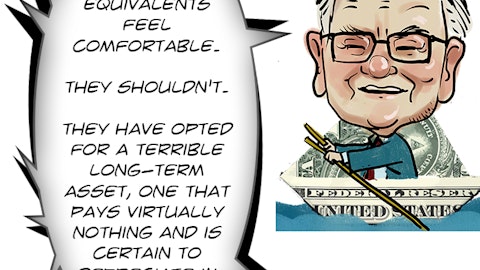Berkshire Hathaway Inc. (NYSE:BRK.A) traces its roots back to 1839 when a textile manufacturing company named Valley Falls Co. was founded by Oliver Chace. In 1929, Valley Falls merged with Berkshire Cotton Manufacturing Co., and the combined entity was renamed Berkshire Fine Spinning Associates. Warren Buffett, who was a lesser-known-investor back then, started buying Berkshire’s stock in the 1960s. Buffett took full control of the company in 1965. Under his leadership, Berkshire became one of the world’s largest holding companies.
Omaha, Nebraska-based Berkshire recently announced its financial results for the fourth quarter and full year. The company reported earnings of $35.835 billion for the quarter, up 23 percent from the same period last year. However, earnings for the full year fell 48 percent to $42.521 billion. Berkshire’s net income mostly depends on gains from big investments in different stocks.
Operating income increased 14 percent on a year-over-year basis to $5.02 billion in Q4. However, operating income for the full year slipped 9 percent to $21.922 billion. The drop was mainly attributed to the negative impact of the Covid-19 pandemic on its business.
Berkshire Hathaway announced that it repurchased $9 billion worth of its shares in the fourth quarter, and nearly $25 billion worth of shares during the FY 2020, indicating Buffett’s confidence in his own company. Berkshire shares rose nearly 4 percent in the mid-day trading Monday following the results.
Follow Berkshire Hathaway Inc (NYSE:BRK.A)
Follow Berkshire Hathaway Inc (NYSE:BRK.A)
Receive real-time insider trading and news alerts
Separately, Buffett interestingly admitted a mistake in the annual letter to shareholders released along with the quarterly report. He stated in the letter:
“The final component in our GAAP figure – that ugly $11 billion write-down – is almost entirely the quantification of a mistake I made in 2016. That year, Berkshire purchased Precision Castparts (“PCC”), and I paid too much for the company. No one misled me in any way – I was simply too optimistic about PCC’s normalized profit potential. Last year, my miscalculation was laid bare by adverse developments throughout the aerospace industry, PCC’s most important source of customers. In purchasing PCC, Berkshire bought a fine company – the best in its business. Mark Donegan, PCC’s CEO, is a passionate manager who consistently pours the same energy into the business that he did before we purchased it. We are lucky to have him running things. I believe I was right in concluding that PCC would, over time, earn good returns on the net tangible assets deployed in its operations. I was wrong, however, in judging the average amount of future earnings and, consequently, wrong in my calculation of the proper price to pay for the business. PCC is far from my first error of that sort. But it’s a big one.”





